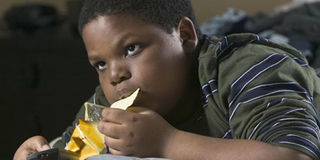Battle with excess weight

Many parents today are giving in to their children’s cravings for often unhealthy foodstuffs.
What you need to know:
- With our mostly sedimentary lifestyles today and growth of the fast food industry, more families have found themselves with children who are struggling with weight related issues.
Is your child overweight?
Two weeks ago, a prominent primary school in Kampala rounded up all the girls for an intimate girl chat after discovering that many were shunning swimming lessons.
When asked why they had stopped, the pupils gave body image related issues, especially being overweight, as the reason. “Most chubby girls are afraid of wearing swimming costumes. The boys too don’t help matters by calling them “big mama fatsos,” explained one of the participants at that meeting.
Overweight babies, obese children and morbidly obese adults have become our reality in Uganda. Dr Edward Mugisha of Keserena Children’s Hospital in Bukoto points out a change in lifestyle and genetic hormonal imbalances as the biggest causes of overweight among children. “Many children are spending less time exercising and more time in front of the TV, computer, phone, tablet, or video-game console. And today’s busy families have fewer free moments to prepare nutritious, home-cooked meals,” Dr Mugisha explains.
Some children, especially those born to diabetic mothers become overweight due to an over secretion of growth hormones.
Causes of overweight
Many parents today are giving in to their children’s cravings for often unhealthy foodstuffs. “I have personally witnessed a parent pack a dozen sausages, three packets of splash and a medium sized tub of ice-cream as a snack for her ten-year-old daughter. As parents, we are turning the next generation into an obese generation,” says Silver Kuteesa, a property developer.
However, genetics too play a role in what children weigh. “Endocrine problems, genetic syndromes, and medicines can be linked to excessive weight gain. Also people in the same family tend to have similar eating patterns, maintain the same levels of physical activity, and adopt the same attitudes toward being overweight. A child’s risk of obesity greatly increases if one or both parents are overweight or obese,” reveals Dr Mugisha.
How to tell if your child is overweight
Dr Mugisha says for children younger than two years, doctors use weight-for-length charts to determine how a baby’s weight compares with his or her length. Any child who falls at or above the 85th percentile may be considered overweight.
For children above two years, doctors use body mass index (BMI) height and weight measurements to estimate a person’s body fat. Once your child’s BMI is known, it can be plotted on a standard BMI chart. Children whose BMI falls below the 5th percentile are underweight, those at the 5th and less than the 85th percentile have normal weight, those at the 85th and below 95th percentiles are overweight and those at or above the 95th percentile are obese.
How to reverse overweight and its effects
Tweak that diet
Purity Wako, a nutritionist, encourages parents to have a balanced and regular menu properly written down and prominently displayed where every family member can see it for the whole family. It should be diverse and composed of healthy foods which includes at least five servings of fruits and vegetables daily, and limited sugar-sweetened beverages.
Change of eating habits
Janat Haguma a mother of three ensures eating time is exclusive not combined with watching TV or other activities.
Get active
Get the children involved in regular physical activity like sports, walking, playing, skipping, dancing among others. Think active leisure activities over passive entertainment. Restrict internet, TV and videogame time.
Effects of excess weight on your children
Physical effects
Overweight will present physical problems like bone and joint defects and breathing challenges.
Cardiovascular issues
Cardiovascular risk factors (including high blood pressure, high cholesterol, and diabetes) that develop in childhood can lead to heart disease, heart failure, and stroke in adulthood.
Low self-esteem
Tomson Nowamani, a child development expert, says that obese children are likely to have emotional issues to deal with (such as low self-esteem), and may be teased, bullied, or rejected by peers, which leads to more problems like depression or substance abuse among others. “And because overweight children tend to experience precocious puberty, they will be more sexually mature than their peers, leading to behavioural problems and stigma,” explains Nowamani.
The don’ts
Weight targets – Don’t set specific weight targets. Instead, focus on healthy eating habits and increasing physical activity with praise for your child when they are successful in these areas.
Crash dieting – A growing child needs a wide range of foods for healthy development. A crash diet that limits kilojoules too drastically or cuts out a food group should be avoided. Reducing kilojoules by a small amount and doing that every day is the goal.
Betterhealth.com




